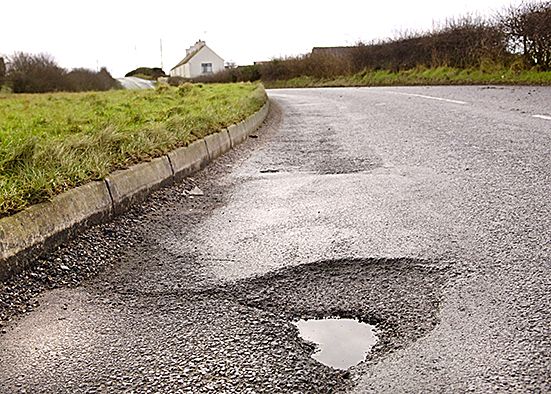£800k payouts owing to road pothole claims
£800k payouts owing to road pothole claims
18 December 2024

THE Department for Infrastructure has shelled out almost £800,000 in compensation to local drivers whose cars were damaged by potholes, new figures have revealed.
The government department paid out on 90% of over 700 claims during the last financial year for incidents across the Newry, Mourne and Down area.
It has also been revealed that a staggering 20,000 potholes were reported across the council area last year – the highest number in Northern Ireland – equating to as many as six potholes for every kilometre of road.
The scale of the problem topped the agenda at a recent Stormont debate with local MLAs alarmed at the scale of the pothole issue across what is the province’s third largest council area.
The statistics which have been produced by the DfI not only highlight the scale of the problem, but increase fears that another severe winter could exacerbate the pothole issue which politicians fear the government department may never get on top of, with sections of roads continuing to crumble at a worrying rate.
South Down MLA Andy McMurray said the “bottom line” was that the local council area had the worst roads in Northern Ireland – “and it’s a tag no one will be proud of”.
He said drivers had reported damage to their vehicles and highlighted discomfort including back pain which was inflamed by driving over potholes.
Mr McMurray said parents of special needs children had reported difficulties trying to keep them comfortable on journeys due to roads littered with potholes.
“The DfI data shows poor road conditions are particularly severe in the Newry, Mourne and Down area,” he said.
“With 20,005 reported potholes in 2023, the district has the highest number of surface defects in Northern Ireland by a substantial margin and it also has the worst ratio of potholes to road length.”
Mr McMurray said that for the past five years Newry, Mourne and Down was the council area with the highest number of claims resulting in compensation.
“Vehicle damage claims locally have nearly tripled over that time, reaching 704 claims in 2023-24, with the DfI paying out on nearly 600 of them at a cost of over £770,000. Most of that increase was due to potholes.”
Mr McMurray said potholes can cause a lot of damage and that in most of the 600 cases the DfI paid out on, a vehicle was damaged.
He said the DfI data also reveals that ove the past five tears, 120 claims were made because someone was physically hurt due to a road defect.
“Potholes are more dangerous for vulnerable road users,” he continued.
“That includes cyclists, motorcyclists and pedestrians, especially those with reduced mobility. That is easily forgotten when the focus is on damage to cars.
“Vulnerable road users can be seriously hurt if they ride through or trip over a pothole or veer into traffic in order to avoid one. Those road users are also at increased risk from other drivers losing control of their vehicles.”
A keen cyclist, Mr McMurray said a DfI survey on road safety showed that 40% of cyclists revealed that poor road conditions made them feel unsafe, ranking behind only heavy traffic and inconsiderate drivers.
He continued: “Road repairs have been significantly affected by long-term underinvestment and staff shortages within the Department for Infrastructure.
“As a result, it has operated only an essential road maintenance service for several years now, where only the highest-priority defects in areas of high risk are being fixed.”
Mr McMurray said a report by the Northern Ireland Audit Office, which was published last week, focused on road openings by utility companies and revealed they don’t always reinstate roads and footpaths to the required standard.


